Not only are chickens extremely easy to raise, but they are also very productive. Chickens provide you with meat to eat, and eggs for breakfast, and you can breed them for a profit. However, for first-timers, it is important to be aware of the mistakes you should avoid. Let’s talk about the most common chicken mistakes you should avoid if you want to raise some.
Failing To Predator Proof Your Coop
Predator attacks are awful, especially when you can’t avoid them. One of the most common chicken mistakes that newbie raisers make is failing to put the necessary precautions in place. Unfortunately, this oversight can lead to losing an entire flock overnight in a single attack. The best way to avoid this mistake is to predator-proof your coop. Here are some tips:
- Don’t use chicken wire because it doesn’t keep out small predators like weasels. Hardware cloth is the most effective way to predator-proof your coop.
- Do your best to close all small gaps because rats and weasels are known to squeeze through holes the size of an adult thumb.
- At night close all doors and windows and latch them.
- Cover the roof on the chicken run.
- Place hardware cloth on the bottom of the chicken run if you have dirt floors to prevent digging predators from coming in.
- Get a well-trained dog, it will scare any predators, and provide your chickens with around-the-clock protection.
- Your presence in the yard during the free-range time will scare off any predators. But it is not advised to stand outside for long periods of time during the winter months.
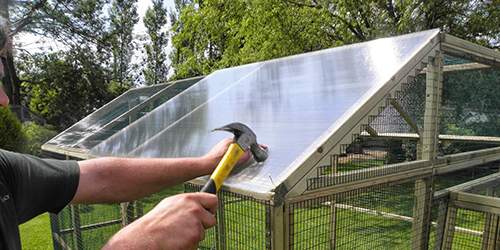
Night Time Chicken Count
Free-ranging is a great way to raise chickens, but it is also the easiest way to lose them because it gives predators easy access. Count your flock before putting them to bed, if there are any missing, you can search for them before it gets dark.
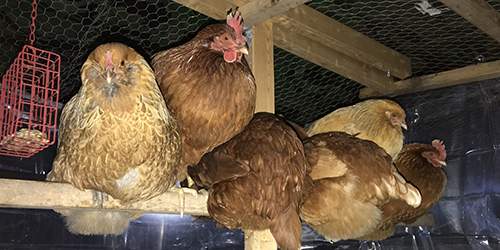
Chicken Coop Heat Lamp
In theory, a heat lamp makes sense, but in practice, it’s a dangerous option. One of the common chicken mistakes is using heat lamps to keep coops warm during winter. Many coop fires have started because of heat lamps, killing entire flocks and destroying property. Heat lamps are difficult to secure, and there’s always a risk they’ll fall onto dry bedding, especially with active chickens in the coop.
The truth is, there’s no need to heat a chicken coop. Chickens’ bodies are biologically designed to protect them from the cold. However, if you think your chickens need extra heat, avoid making this mistake. Instead, call a professional to ensure the job is done safely.

Feeding Chickens the Wrong Food
Chickens are omnivores, which means they like eating all types of foods including dairy, meat, fruit, and vegetables. Although chickens enjoy variety, there are some foods they should not eat, here are some of them:
- Processed foods
- Junk foods
- Uncooked rice, pasta, beans
- Fried foods
- Onions
- Citrus fruits
- Leaves from rhubarb, potato plants, and tomato plants
- Sweets, desserts, chocolate, candy
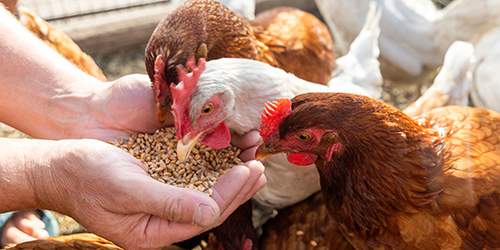
Using the Wrong-sized Coop
Small chicken coops don’t work well in a backyard. They are not sturdy enough, they don’t hold up well during bad weather, they probably won’t be big enough for your needs, and they give predators easy access. Even if you don’t plan on keeping a lot of chickens, too much space is better than not enough space.
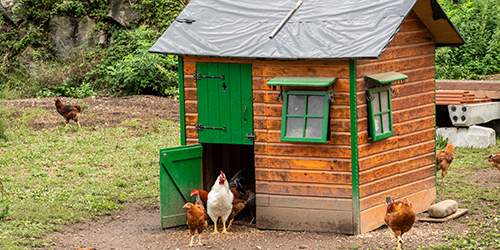
The Wrong Temperature In The Chick Brooder
When first-time chicken rearers bring their basket of furry chicks home, they make the mistake of keeping the brooder too hot or too cold. The wrong temperature can be dangerous, and can cause permanent damage to your chickens; therefore, be sure to keep it at around 95 degrees F. Check the temperature often using an infrared thermometer, and adjust it if required.
Not Prepared For Extreme Weather
Chickens adapt quickly to weather changes, but extreme conditions can still pose challenges. One of the common chicken mistakes is failing to prepare adequately for unpredictable weather. During the winter, it’s crucial to protect your chickens from the cold, wind, and snow. Insulate the coop with horse blankets and add extra bedding to keep them warm.
When the temperature drops significantly, feed your chickens hot oatmeal for extra energy, and regularly check for signs of frostbite or hypothermia. Avoid making the mistake of overlooking these simple steps, as they can help your flock stay healthy through the toughest weather.
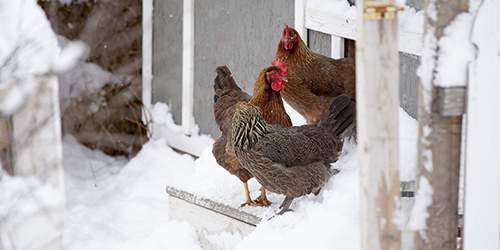
During the summer months, make sure you have plenty of fresh, cool water available. If there’s a heatwave, give the chickens a frozen treat such as fruits or vegetables. Allowing your chickens to free-range will give them the chance to get out of the sun because they will find the coolest part of the yard to perch in.
Leaving the Garden Open
Chickens enjoy destroying gardens and as soon as they are given access, they will run riot and uproot all your hard work. The only way to prevent this is to protect your garden with a tall fence.
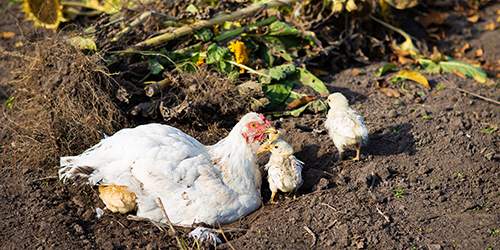
Not Using the Right Bedding
A lot of first-time chicken rearers make common chicken mistakes when it comes to choosing bedding for their little ones. Many assume that any type of bedding will work as long as it’s comfortable. However, using the wrong bedding can harm your chickens. For instance, don’t line the brooder box with newspaper. Not only does it fail to absorb liquid, but more importantly, it’s slippery. This lack of traction can cause spraddle legs, a condition where chicken legs splay apart.
Another mistake is using cedar bedding, which can lead to respiratory problems. Instead, start with paper towels for newborn chicks. After a few weeks, switch to pine shavings. They’re easy to clean, highly absorbent, and safe for your growing flock. Avoiding these common chicken mistakes will help ensure your chicks thrive in a healthy environment.
Don’t Leave Eggs To Accumulate
Collect fresh eggs from the nest boxes daily. In average weather conditions, twice a day is good enough. However, during the hottest months of the summer, and the coldest months of the winter, it’s important that eggs are not left outside all day, or eating them can become unsafe.
- Collect eggs three times a day during the winter months. Throw away any eggs that are frozen or cracked.
- Ideally, you should store fresh eggs at room temperature or keep them in the fridge. During the hottest summer months, the outdoor temperature far exceeds room temperature. To prevent any issues that can arise due to overheated eggs, collect fresh eggs three times a day.
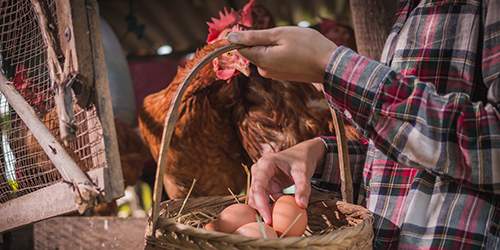
It’s really exciting raising chickens. These birds will definitely keep you on your toes. As long as you are diligent in avoiding the above mistakes, you will have plenty of chickens to keep you company all year round.
You may also like:
If You See These Eggs In Your Backyard, Burn Them Immediately
Do You Know Why You Should Never Put A Tall Fence Around Your House? (Video)
What We Learned Living on Our Food Storage for a Month
How To Organize Your Garden For Maximum Harvest
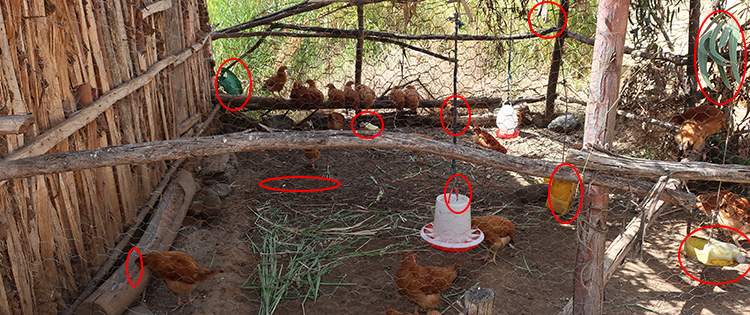








I paid for a book along time ago and have not received one yet, all I get is emails, please send me the book I ordered. 424 s7th ave Durant OK 74701
Hi Don,
Thank you for your interest in our work.
I am sorry that your book was not delivered.
Please check your Inbox (and Spam folder), we have sent you an email with your order and shipment details. You will receive it from support@selfsufficientprojects.com
If there is anything else I can help you with, please don’t hesitate to ask.
God bless,
The Self-Projects Backyard Team